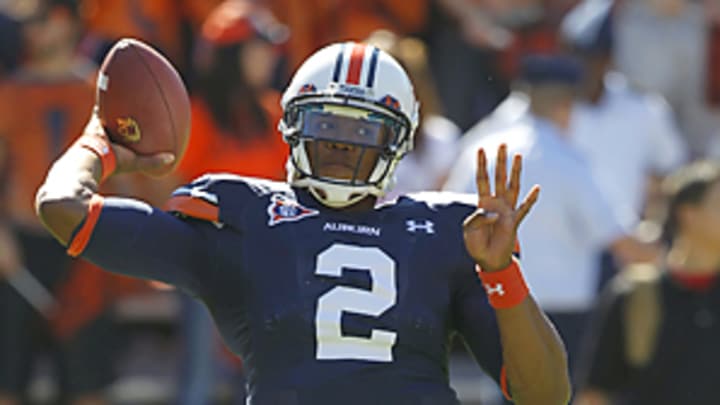Cam Newton allegations could be huge blow for Auburn, entire sport

Just when you'd forgotten about Marvin Austin and A.J. Green, Nick Saban's "pimp" speech and Reggie Bush's forfeited Heisman, another scandal has rocked the sport. Only this time, we're not talking about a guy from five years ago forfeiting his Heisman or a star receiver selling his jersey. We're talking about the undisputed brightest star of the 2010 season, Auburn quarterback Cam Newton, suddenly embroiled in seedy allegations at a time when his team is in the stretch run of a possible BCS championship berth.
To be clear, as of Thursday evening, neither Auburn, nor Newton nor his family has been publicly accused of any wrongdoing. Anything to the contrary is assumption or innuendo, and Newton is not being withheld from competition.
"I will say this very loud and clear," Auburn coach Gene Chizik said Thursday night. "Cam Newton is eligible at Auburn University. Period. End of story."
But an ESPN.com report Thursday details allegations that Kenneth Rogers, a former Mississippi State player-turned-agent who claimed to be representing then-recruit Newton, sought $180,000 from that school to sign the quarterback. Mississippi State turned Rogers in to the SEC, and at some point the NCAA began investigating Newton's father, Cecil, asking for bank statements.
"It's not true," Newton's father said Thursday night. "The allegations are completely unfounded, and we've retained an attorney. That's all I can say at this time"
SEC and Auburn have apparently known of the allegations since at least July, yet Newton has not missed a down. In most cases, if a player's eligibility is even remotely in question, a school sits him until the matter is resolved (as North Carolina did with several players earlier this season.) Either Auburn did its due diligence and feels confident Newton's family did no wrong, or it's taking an incredibly brazen risk in suiting up a player at the center of an ongoing investigation.
Whether guilty or innocent, the presumptive Heisman front-runner now carries an inescapable stigma. The kid with the big smile and postgame exuberance, the highlight-reel runs and pass-efficiency prowess, is now linked to the ugly words "extra benefits" and the eye-popping numbers "$200,000" (the figure Rogers claimed "other schools" had offered). It also shines new light on the increasingly pervasive and disgraceful practices of individuals like Rogers, whose company Elite Football Preparation holds camps for college prospects and claims to "match high school athletes with college programs."
He and others like him are the football equivalent to the shady AAU coaches that have long brokered behind-the-scenes deals for elite basketball prospects. The NCAA is only now starting to get a handle on them.
The state of Alabama is no stranger to pay-for-play schemes. One can't help flashing back to the name Albert Means, the Crimson Tide defensive lineman whose high school coach sold him in exchange for a promised $200,000 from boosters. The scandal wound up landing Alabama a two-year bowl ban and other severe NCAA sanctions. Auburn has a history of insidious boosters, earning its own bowl ban in the early '90s over benefits to defensive back Eric Ramsey. Former coach Terry Bowden claimed in 2001 that a horde of boosters were "paying players cash, $12,000, $15,000 to sign," when he first arrived in 1993.
But in both those cases there was a smoking gun -- Memphis high school coach Milton Kirk blew the whistle on his boss, Lynn Lang, for arranging the Means deal, and Ramsey caught an Auburn booster on tape discussing his scheme. As of now, we have no evidence that Rogers made any such demand to Auburn on behalf of Newton, or that any dollars ever changed hands. We only know what didn't happen -- that Mississippi State did not take up Rogers on his offer.
But college football fans are understandably skeptical. They've seen enough sleaze infest the sport over the years -- just during this year, for that matter -- to believe that where there's smoke, there's fire. There's Newton's admittedly odd statement to Sports Illustrated a couple weeks back that he had initially preferred to play for his former Florida offensive coordinator, Dan Mullen, in Starkville, but that he let his father make the decision for him. Cecil chose Auburn. And there are the mysterious circumstances as to why one of his father's churches, Holy Zion Center of Deliverance in Newnan, Ga., went from the brink of city-mandated demolition in 2009 to securing enough money to undergo renovations last spring.
For all these reasons, a cloud of suspicion will more than likely hang over Newton for as long as he remains at Auburn, tainting what had been a thus-far redemptive story for the former Florida and junior college transfer. Will Heisman voters hold the pending investigation against him? Will it distract him or his teammates from the looming Iron Bowl showdown with Alabama and the possible SEC and national championship games that might follow?
Of most vital urgency -- is there a chance the best player in college football may eventually be shelved?
It's hard to imagine that will happen. If it was ever a possibility, Auburn would be grossly irresponsible to have played him to this point. But the fact it's even become a question is yet another unfortunate, unsurprising window into the underbelly of college football. And another agent-related scandal is always lurking around the corner.
